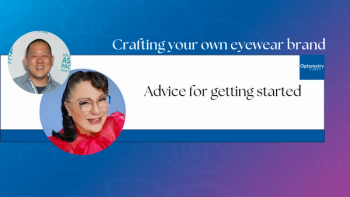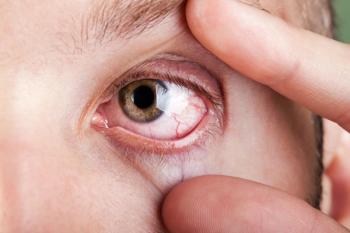
Paul Farkas, OD, FAAO, and Adam Farkas, MD, MBA ODwire and CEwire founders
Changing profession, online CE, and working with your dad
Adam, how did you get from med school to tech geek?
After I went to med school, Michigan offered me a spot in their MBA program. This was in the ‘90s, and those programs were unusual. I thought, “This would be interesting, they’re giving me the opportunity, I’m not going to pass it up.” I moved on from there into doing technology in medicine, particularly running software companies that have to do with tech in medicine. The rest, as they say, is history.
Paul, how has optometry changed since you started practice?
The big difference is that we have vision care plans now that have almost sucked the life out of private practitioners. When I first went into practice, the American Optometric Association (AOA) was an organization that was more than just paying your dues. In those days, you had to practice in a certain way that the AOA deemed ethical. You could not practice under an assumed name. If you had a street-level location, no frames were allowed in the window if you wanted to be an AOA member, and most important of all, there was no advertising. Once the 1970s came along, it all changed.
Why is online CE important?
Adam: The requirements for CE are going up, up, up. Back in the olden days, you didn’t really need that much of it, and it was kind of a joke. But over time, the states are requiring more CE and stricter requirements around CE where you listen what you’re doing. With the hour requirements going up, people are having a difficult time getting the hours they need affordably. The people are telling us they like online CE because they can do it whenever they feel like it. I had one guy tell me that he was watching lectures on his cell phone while he was mowing his lawn. [Laughs]
Paul: Ah, but at the end of his lecture he has to pass an exam, which is unlike in-person CE where you can sit there. As an ex-speaker, I can tell you that one of the great pleasures of giving a presentation was to watch people spread out big newspapers and they were reading while I was trying to lecture -that’s if I’m lucky - many of them were asleep. But they put that hour in, that 50-minute hour, and they got credit for it. At least now with state boards allowing online CE, what’s required is that they pass a quiz at the end of the hour for them to get CE credit. So you can at least be assured that they are absorbing the material.
Adam, what’s it like working with your father?
Adam: Painful. Painful. [Laughs] This morning we were shooting one of our ODwire radio shows. Paul came over to my little studio here in the basement. Ten minutes before we’re ready to go, the studio’s set up, he dumps an entire large coffee all over the floor.
Paul: I get into terrible trouble.
Adam: Working with him is interesting because of the generational issues that we have. When I try to implement anything technology-wise, having to run it by him is very important because he can show me in a very real way where people might have difficulties.
Paul: I’m the low bar. [Laughs]
Adam: But you know, it’s nice having that built-in test-unit, essentially what he is, and it’s been nice over the past decade to have him there in that role because it allows us to rapidly evolve what we’re doing and learn what works and what doesn’t.
What do you do for downtime?
Adam: I have no more downtime because I have seven-year-old at home. My downtime is doing dad things these days.
Paul: My downtime is trying to keep myself alive. [Laughs] ODwire is a 24/7 type of business, so I’m working starting at seven in the morning, but I make certain that by 11 a.m. I’m out either taking a one-hour walk for two miles or I’m in the club swimming.
Paul, how did Seniordoc morph into ODwire?
In the early ‘70s, I decided to try to get some of the practitioners who were older than me to start having something called the “Round Robin Group” where each of us would get on a cassette tape, say our piece for about a half hour or so, and move the tape on around the country. There were about eight optometrists. This was our therapy session-talking about clinical items, practice management topics, optometric politics, and it would go round and round.
The practitioners started aging, they were 10 years my senior, and the topics started changing from clinical things and practice management things to aches and pains and medical things. I felt like I was sitting in a swimming pool in Florida listening to old people. Ultimately, the Round Robin ended about 2000.
I said, “Adam, I think there’s something called the Internet that’s starting, and I think that people should be able to communicate using the Internet but the old guys will not have a clue what to do. Set up something that would be so easy to use that even a moron like myself can handle it.” So, he did, and we called it Seniordoc.
Anyone who was over 50 was relatively clueless about computers, especially in optometry. We started using it there, but I didn’t get enough people to start posting. I didn’t realize that most people of my contemporaries never learned to type. I noticed that younger people were coming onboard, and they were taking over Seniordoc.
I said, “We have to change the name.” It turned out to be ODwire.
Why are online forums important to the profession?
Adam: They are very much a supplement or even a replacement for face-to-face contact. Most clinicians, you’re in a dark room all day by yourself, right? If you think about what people do on a daily basis, there’s very little opportunity to talk to other clinicians, so this is why it’s very important to have that f outlet where you can bounce things off people in a place that’s safe online.
Paul: Safe, and you can talk about just about anything provided you don’t insult one another [laughs] and don’t use foul language. Sometimes you say things that people in power should hear but don’t. So, there’s free-wheeling conversation without censorship.
Adam: For us, the idea that you can talk about anything is very important. If you see something that is a terrible idea that’s being implemented, you should be able to talk about it [laughs] at least in a civilized way. A lot of times people don’t or they can’t because they see each other only two or three times a year at these conferences. So if something bad is happening, you might not be able to articulate what is going on except for a few times a year.
Paul: And also the value of immediacy. Being in print media, it can take a couple of weeks’ lead time. If you’re doing something online, it can be within seconds.
If you could rebuild Odwire from scratch right now, knowing what you do today, what would you change?
Adam: ODwire itself, infrastructure-wise, has been rewritten three or four times. You can’t do the same thing over and over again because technology changes. About every three or four years we get that itch where we have to evolve the site to make it better. For instance, when we first started out, mobile computing wasn’t even real; tablets were not a thing, phones were not a thing, but all of a sudden they became a thing. When you get these paradigm shifts, we constantly have to reengineer the site.
I’m not so sure what I would do differently from the community side of things. We’re different in that we’re private-everyone who’s there is an OD and gets vetted by Paul before they’re allowed in. Paul’s like the crazy old guy with the shotgun on the porch, like he guards the place. [Laughs] Steve Jobs had a very famous saying that users don’t know what they want. You have to show to them. To some extent that’s true, but I think these days people are becoming much more savvy about what technology can do. So, listening to the users of the site and evolving it based on their input is something that we’re doing a lot more.
Paul: When you have 22,000 people, you can blow up stuff.
Adam: You want to talk about a daily hassle, if I had it to do all over again, I would split moderation duties and get more people to moderate vs. just Paul and myself. I would have gotten different moderators for different parts of the site and let them run with each one of their sections. Moderation is one of the biggest challenges we have a on a daily basis, balancing moderation with freedom of speech. We almost always come down on the freedom of speech side.
What’s one thing you would change about optometry as it stands now?
Paul: There would be schools closed; I think we have about 20 optometry colleges now. I would close down half of them. I would keep the university-affiliated optometry schools; the ones that can’t make it financially would go first. But certainly the newest optometry colleges have no business being in the education business, and I say “business” because they’re not owned by optometrists.
I would try to get the tuition to a reasonable rate, which means I would set up scholarships from corporations that benefit from successful optometrists. They should be funding the schools so these kids don’t have to come out of school with $200,000 to $300,000 worth of debt.
Adam: [Laughs] Way to make friends, there, Dad. I see from a lot of people an inferiority complex. I can say this as an outsider looking in, there’s an inferiority complex that is unjustified because what optometrists do, they actually do better than anyone else. I would change the mindset. There’s so much opportunity that people are unaware of, or they’re unwilling to put themselves out there and explore different ways of working, and it leads to quiet desperation.
Paul: It happens not only in optometry, it happens in podiatry, it happens in dentistry. You’re not a real doctor. Unless you have an MD after your name, many people don’t consider that you are a real doctor, and including the MDs.
Adam: If you’re willing to put in the work, to learn the new procedures, to use the amniotic membranes or punctual plugs, you can earn a good living, and you can do this better than just about anyone else.
Paul: But how does the public learn about it? When someone wakes up with a red eye, what happens? They go to their primary care doctor or to an ER , but they would rarely think of going to their family optometrist for that red eye because most don’t associate pathology with optometry. Who’s fault is that? I fault the public relations department of the AOA for not having enough public information about optometrists’ abilities other than selling contact lenses and eyeglasses.
Adam: It makes economic sense as well. There’s no cheaper way to treat a red eye than to send it off to an OD. The fact that anyone considers going to urgent care or an ER…it’s a real indictment of what’s going on.
Paul, any regrets?
Everybody has regrets, you know. If you look back at your life, everyone has crossroads, and everyone says, “I coulda-woulda-shoulda.” But you got to keep getting up to bat or you’re not going to hit the home run. So you keep getting up to bat-you get a few winners, you get a lot of losers, but overall, I can’t say I’ve had too many regrets.
What’s the craziest thing you’ve ever done?
Adam: I’m not particularly a crazy person by nature. Work with my dad on ODwire, now that I think about it.
Paul: If you’re suicidal. [Laughs]
Adam: I think honestly the craziest thing I ever did was actually undertake this project.
Paul: And then make it into a full time occupation. Don’t forget, Adam has tremendous credentials. He’s very modest but with an MD and an MBA he could do most anything.
Adam: This thing is ruling my life now. [Laughs] Working with my dad, craziest thing I’ve ever done.
Paul: I’ve done so many crazy things. I’m the youngest in my family, so I have nephews who are almost my age. Once I went with my nephew on a Windjammer cruise to the Caribbean, and he egged me on to do deep sea scuba diving. I went off the boat, and I sunk like a rock. My mask came off, I had trouble breathing, and I did a very quick risk/benefit. The benefit is I may see some fish, but the risk is I can die. [Laughs] That was the last time I attempted scuba diving.
Newsletter
Want more insights like this? Subscribe to Optometry Times and get clinical pearls and practice tips delivered straight to your inbox.













































